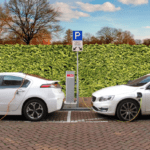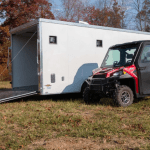Installing an electric car charger is easier and more affordable than most people think. If you’re wondering how to set up an EV charger at home or work, how much it costs, and what you need to get started, you’re in the right place. This guide breaks down everything in plain language-from permits to costs, to which charger suits your vehicle best.

Whether you’re planning a home EV charger installation, setting up a commercial EV charging station, or just curious about electric vehicle charger setup, this beginner-friendly guide will walk you through the entire process, step by step.
What Is Electric Car Charger Installation?
Electric car charger installation refers to the process of setting up a charging point that powers your electric vehicle safely and efficiently. These setups can be done in homes, offices, parking lots, or public spaces.
A properly done EV charger home installation can:
- Charge your EV faster than a standard wall outlet.
- Save you money in the long run.
- Boost property value.
- Reduce your carbon footprint.
Most EV owners install Level 2 EV chargers at home, while businesses or malls often go for DC fast charger installations for quick public access.
Types of EV Chargers Explained
Choosing the right charger is key to a smooth experience. Let’s explore the most common types.
Level 1 EV Charger Installation
- Power Source: 120V standard household outlet.
- Speed: 4–5 miles of range per hour.
- Best For: Overnight home use with short commutes.
- Cost: Minimal—uses existing outlet.
Level 2 EV Charger Installation
- Power Source: 240V outlet (like ACs or ovens).
- Speed: 20–30 miles per hour.
- Best For: Homeowners, businesses, apartment complexes.
- Cost: ~$800–$2,000 including hardware and labor.
DC Fast Charger Installation
- Power Source: 480V+.
- Speed: Up to 80% charge in 30–60 minutes.
- Best For: Commercial/public charging stations.
- Cost: $20,000–$60,000+ (for businesses).
Each of these options has its own installation and power requirements. Choosing the right one depends on your daily driving distance, budget, and charging location.
How to Choose the Right EV Charger for Home or Business
Before jumping into the installation, ask yourself:
- Do I drive long distances daily?
- Can my home’s electrical panel support a Level 2 setup?
- Will others (guests, employees, tenants) use the charger?
For personal use, a home EV charging station with a Level 2 charger is ideal. Businesses, on the other hand, should consider workplace EV charger setup with multiple ports to support employees and visitors.
If you’re considering a residential EV charging station, also factor in smart features like WiFi connectivity and energy tracking.
Step-by-Step EV Charger Installation Process
Installing an EV charger involves more than plugging in a cable. Here’s how it’s done:
1. Evaluate Your Electrical System
Have a licensed electrician check if your current electrical panel can handle a charger. If not, you may need a panel upgrade.
2. Choose the Right Location
Pick a spot that’s safe, sheltered, and within reach of your vehicle. Wall-mounted chargers are popular for garages.
3. Apply for Permits (If Required)
Most local authorities require an installation permit. EV charger permit requirements vary by city/state.
4. Hire a Professional
Never DIY unless you’re a certified electrician. EV charging station contractors will ensure code-compliant work.
5. Install the Charger & Test
Your contractor will connect the charger, install necessary breakers, and run final tests for safety.
This entire EV charging installation process can be completed in 1–2 days for homes and up to 2 weeks for commercial setups.
EV Charger Installation Cost in 2025
Cost can vary depending on charger type, complexity, location, and permits.
| Installation Type | Average Cost (INR/USD) |
|---|---|
| Level 1 | ₹3,000–5,000 / $50–$100. |
| Level 2 (Home) | ₹50,000–1,50,000 / $600–$2,000. |
| DC Fast Charger | ₹10–30 Lakhs / $20,000–$60,000. |
Additional expenses include:
- EV charger setup cost (unit price).
- EVSE installation cost (labor).
- EV charger wiring guide & conduit needs.
- EV charger circuit requirements (breaker & amperage).
If trenching or wall-cutting is required, add another ₹20,000–₹50,000.
Permit & Safety Requirements You Must Know
Permit Requirements
Most municipalities require:
- Site plans.
- Load calculations.
- Code compliance (NEC Article 625 in the U.S.)
For Indian users, follow BIS and IS 17017 standards.
Safety Tips
- Use surge protection.
- Grounding is mandatory.
- Never install under leaking roofs.
- Follow EV charger installation safety codes strictly.
Ignoring these can result in insurance voids or fire hazards.
Government Rebates, Incentives & Tax Credits in 2025
The good news? There are many programs to lower your EV charging station setup cost.
India
- FAME II subsidy (for public charging infrastructure).
- State-level grants in Delhi, Maharashtra, Gujarat.
U.S.
- Federal EV charger incentives (up to 30% tax credit).
- EV charger rebates 2025 under the NEVI Program.
Europe
- Country-specific EVSE support.
- EU Green Energy Grant schemes.
These rebates can save you up to 50–80% of the installation cost. Always check the latest policy updates.
Common Mistakes to Avoid During Installation
- Choosing the wrong charger size for your vehicle.
- DIY wiring without a permit.
- Installing too far from your parking space.
- Not planning for future EVs (multiple ports).
- Ignoring EV charger panel upgrade when needed.
Avoid these to keep costs low and safety high.
Top Tips for Smooth & Safe EV Charging Setup
- Pre-wire your garage even if you don’t own an EV yet.
- Choose smart chargers with app controls.
- Keep cables away from high-traffic areas.
- Pick brands with warranties and certifications.
- Ask your electrician for a detailed EV charger installation guide.
Also, install a green energy charging station if you’re using solar panels to go fully eco-friendly.
Smart Ways to Save Electricity at Home.
Final Thoughts: Should You Install an EV Charger?
Yes, absolutely! Installing an EV charger at home or work is a smart, future-proof decision. It saves time, reduces fuel costs, and boosts convenience. As more vehicles go electric, charging at home will become the norm.
With this guide, you’re now equipped with all the knowledge to install electric car chargers in 2025—confidently, safely, and efficiently.
“The road to a cleaner future starts with a single charge – install your EV charger today, and drive the change tomorrow.” ⚡🚗🌱
Frequently Asked Questions (FAQs)
1. How much does it cost to install an EV charger at home?
It ranges from ₹50,000 to ₹1,50,000 ($600–$2,000) depending on charger type and labor.
2. Can I install a Level 2 charger myself?
Only if you’re a certified electrician. Otherwise, hire a professional.
3. Do I need a permit to install an EV charger?
Yes, most cities and countries require permits, especially for residential EV charging station setups.
4. Is there a government subsidy for EV charger installation?
Yes, many national and state programs offer rebates, including federal EV charger incentives and government subsidy for EV charger.
5. What type of charger is best for home use?
Level 2 chargers are the most efficient and popular for home EV charger installation.
6. Are there tax credits for EV charger installation in 2025?
Yes, tax credits and rebates are available in several regions. Check local regulations for EV charger rebates 2025.
7. How long does it take to install an EV charger?
Home installations typically take 4–6 hours. Commercial setups may take a few days.
8. Can I install an EV charging point in an apartment building?
Yes, but you’ll need permissions from the society or management board and may need a commercial EV charging installation plan.
Join 25,000+ smart readers—don’t miss out!








